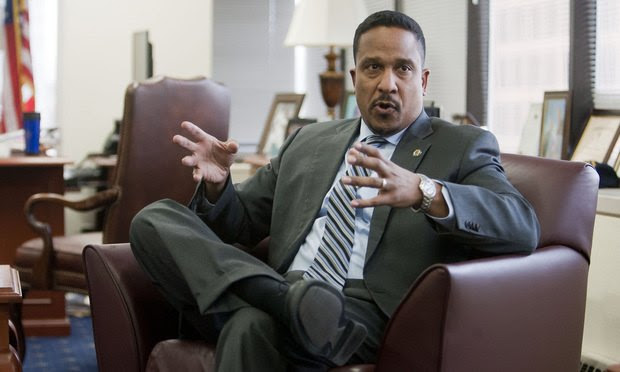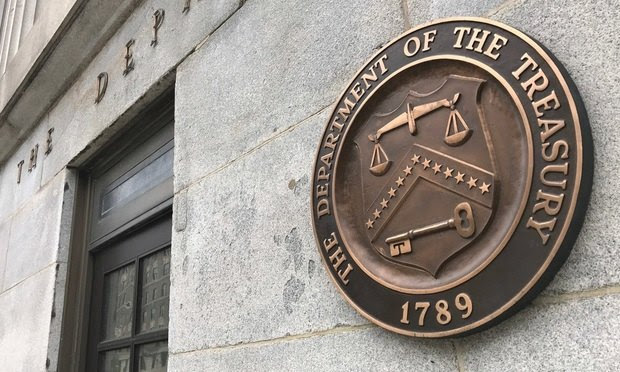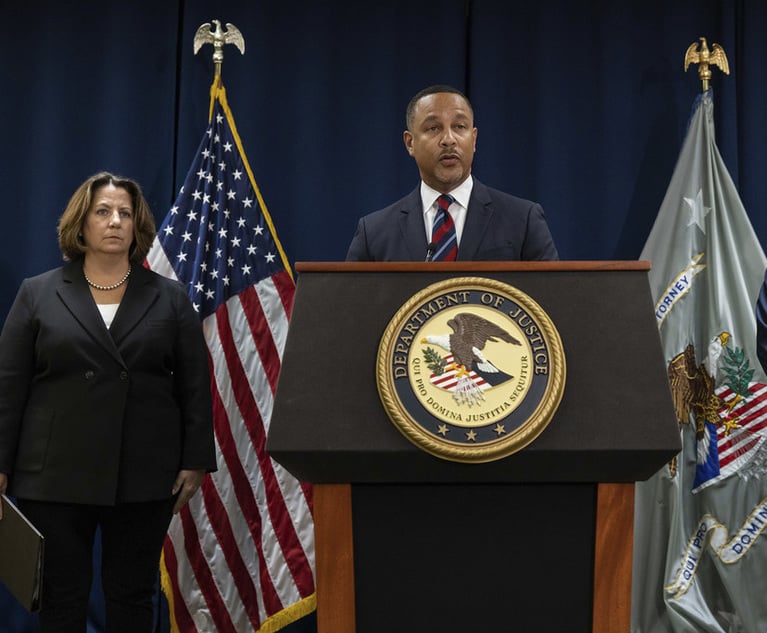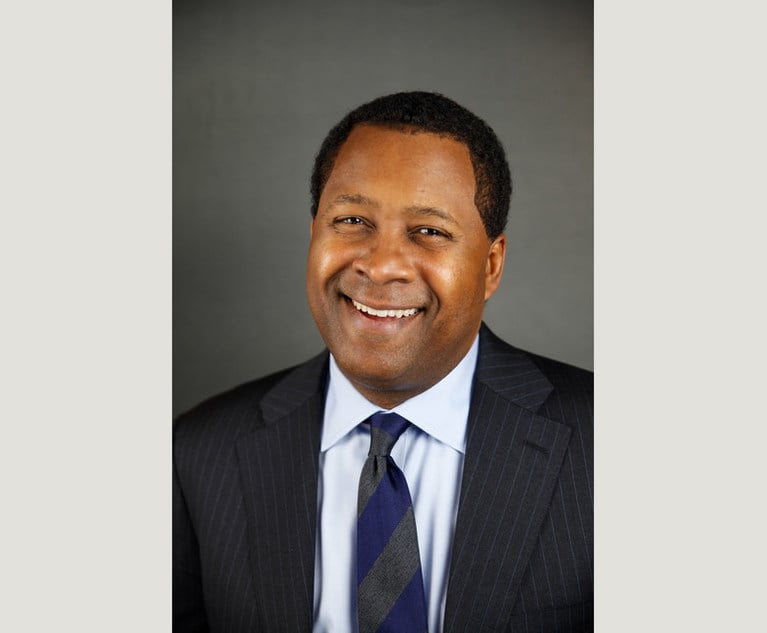Compliance Hot Spots: When a Law Professor Goes to Congress | Messaging Apps and USDOJ | Meet AT&T's Compliance Chief | Who Got the Work & More
US Rep. Katie Porter's unique questioning of corporate executives is adding to the prep work of white-collar and congressional lawyers. Plus: the Justice Department's got new guidance on messaging apps and the retention of evidence. Scroll down for our headlines, including a spotlight on AT&T's compliance chief. Thanks for reading Compliance Hot Spots!
March 19, 2019 at 09:00 PM
10 minute read
Welcome to Compliance Hot Spots. U.S. Rep. Katie Porter's rise to stardom is forcing white-collar and congressional lawyers to step up their client prep game. Plus: we got some observations about the Justice Department's softened approach to messaging apps data retention. Thanks for reading. Tips, feedback and general musings on your practices are welcome. I'm at [email protected] and 202-828-0315, or follow me on Twitter @cryanbarber.

DOJ Softens Approach Toward Messaging Apps
In 2017, when the U.S. Justice Department spelled out its approach to rewarding cooperation in foreign bribery investigations, the policy included a curious line. Companies hoping to receive credit for their cooperation, the Justice Department said, should prohibit the improper destruction of business records, with steps such as “prohibiting employees from using software that generates but does not appropriately retain business records or communications.”
The head-scratching language sent more than a few stray hairs falling to law office floors. Was the Justice Department really trying to tell companies they had to prohibit employees from using ephemeral-messaging apps such as Signal and WhatsApp? It was a common question at conferences centering on federal anti-bribery law.
Now we have guidance from DOJ. Earlier this month, the Justice Department revised its corporate enforcement policy to soften language that appeared directed at messaging systems such as WhatsApp, which white-collar defense lawyers said is widely used around the world for legitimate business purposes.
The new language, which drops the word “prohibiting,” calls for companies to implement “appropriate guidance and controls on the use of personal communications and ephemeral messaging platforms that undermine the company's ability to appropriately retain business records or communications or otherwise comply with the company's document retention policies or legal obligations.”
Quite a mouthful, to be sure. But white-collar defense lawyers are grateful for the effort—and the additional clarity.
>> Kwame Manley, an investigations and white-collar partner at Paul Hastings in Washington and a former federal prosecutor, said the earlier policy was “a bit ineffective because it suggested that corporations were required to ban the use of WhatsApp and other apps.” Manley told me:
“That's not what the policy actually said, but I think it was interpreted in that way. There was also confusion as to how companies are supposed to enforce this. The revised policy essentially says that DOJ wants companies under investigation to have adequate policies and procedures to appropriately retain business records, including records relating to their employees' use of WhatsApp for business purposes. DOJ understands that this is challenging in certain jurisdictions, but companies need to develop and administer adequate controls and policies.”
>> “A prohibition on all modern forms of communication didn't really make sense,” said Wilmer Cutler Pickering Hale and Dorr partner Jay Holtmeier, a leader of the firm's Foreign Corrupt Practices Act and anti-corruption group.
The revised policy, Holtmeier said, “still encourages companies to be appropriately retaining records but not with the same sort of prohibition that wasn't workable or really explainable by the department.”

When a Law Professor Goes to Congress
In a matter of weeks, freshman Democratic Rep. Katie Porter (above) of California has rocketed to stardom exhibiting something rarely seen in Congress: an ability to ask pointed, effective questions at hearings otherwise filled with pontification and political stunts.
Her signature approach, shown in a pair of viral questioning rounds, follows a pattern.
Porter takes powerful executives down a path. With Equifax CEO Mark Begor, she asked if he'd provide his Social Security number and other personal information. Of course, he opted not to. With Wells Fargo CEO Tim Sloan, Porter asked if he really meant it when he said the bank was committed to restoring customers' trust. Of course, Sloan said, he did.
At the end of each path was the moment lawyers are paid handsomely to help their clients avoid in congressional hearings. Porter confronted Begor with an example of Equifax lawyers arguing that the company's 2017 data breach didn't harm consumers. Sloan was shown text from a court filing in which Wells Fargo's hired lawyers dismissed his past comments as corporate “puffery.”
This all has congressional grappling with how to prepare clients for questioning that uses a company's own legal arguments against its top executive.
King & Spalding partner Thomas Spulak, a former general counsel for the House of Representatives, told me this week:
“I think it's important to be as forthcoming as you can be. You have to tell the truth. You have to be careful about omissions. Maybe in a courtroom lawyers will advise you, 'Don't volunteer anything more, just answer the question directly.' In Congress, you have to be careful of what you don't say, because Congress can act very quickly. And something you don't say today, tomorrow could blow up. Members have the ability to speak, issue press releases, say things on the floor. It's very import to not be discovered as being incomplete or leaving out the whole story.”
>> Read my report here at Law.com on how Porter's questioning style has forced lawyers to dig deeper preparing executives for hearings on Capitol Hill.

Headlines: Blockchain Lobbying; AT&T's Compliance Chief; Anti-Corruption Uptick
>> The Evolution of Compliance. Here's a snippet of an interview with Ronald Machen (above) of Wilmer Cutler Pickering Hale and Dorr: “Without a robust compliance program, it is more likely that problems will arise that draw the attention of regulators. This is especially true if a company works in a country that is known to be a hotbed of corruption and contains a weak legal system. While there are sometimes tensions between business and compliance personnel, smart companies realise that the compliance function protects not only their bottom line, but also their employees as regulators, particularly in the US, continue to focus on individual bad actors within companies.” [Financier World]
 David Huntley
David Huntley>> Making Compliance Everyone's Responsibility: A Q&A With David Huntley of AT&T. My colleague Dan Clark has an insightful Q&A with David Huntley , chief compliance officer at AT&T. “While the business is focused on placing products and services into the marketplace, we need to do it with a lens of compliance at the outset. This is what we call built-in compliance. Bolt-on compliance means that you put a product or service out in the marketplace, then you have to now figure out how to make sure that product or service is in compliance with the law. A bolt-on approach can be costly.” [Corporate Counsel]
>> Inside the Blockchain Lobbying Boomlet. “Lobbying on cryptocurrencies and the blockchain technology underpinning them is a niche but growing industry on K Street. The number of entities that reported lobbying on blockchain issues has nearly tripled over the past year, according to disclosure filings—from a dozen in the fourth quarter of 2017 to 33 in the final quarter of 2018.” [Politico]
>> In-House Counsel in Construction Industry May See Uptick in Anti-Corruption Enforcement. Former federal prosecutors, criminal defense attorneys and construction and government contracts lawyers say the DOJ's recent actions, including a multimillion-dollar bribery case against the former execs of Cognizant Technology Solutions Corp., signal that the agency is aggressively expanding its FCPA and qui tam enforcement beyond the more traditional health care and pharma sectors.” [Corporate Counsel]
>> Fifth Circuit Hears Oral Argument in All American Check Cashing. ”The panel's questions and comments provided no clear clues as to how individual judges were leaning. Most of the questioning was devoted to exploring each party's arguments as to why U.S. Supreme Court precedent provided support for its position on the CFPB's constitutionality,” Ballard Spahr's Alan Kaplinsky writes. [Consumer Finance Monitor] Gibson, Dunn & Crutcher appellate veteran Helgi Walker made the argument, as we first noted. Listen to the audio here.

Who Got the Work
>> Erich Ferrari of Washington's Ferrari & Associates is representing the Russian oligarch Oleg Deripaska in a lawsuit seeking to reverse the Treasury Department's “devastating” sanctions against him. Deripaska argues that the sanctions made him “the latest victim of this country's political infighting and ongoing reaction to Russia's purported interference in the 2016 U.S. presidential elections.” My colleagues Mike Scarcella and Nate Robson have more on the suit here.
>> Covington & Burling partner Lindsey Tonsager registered to lobby for American Airlines on data privacy legislation. Tonsager, a one-time intern for former Sen. Tom Daschle, is a leader of the artificial intelligence initiative at Covington, where her practice focuses on privacy and data security matters.
>> A team from Akin Gump Strauss Hauer & Feld will lobby for Accenture Inc. on “implementation issues surrounding the Tax Cuts and Jobs Act,” according to a new federal registration. The Akin team includes Arshi Siddiqui, formerly senior policy advisor and counsel to now-House Speaker Nancy Pelosi; Brendan Dunn, former staff member and legislative assistant to Sen. Orrin Hatch, R-Utah, on the Senate Judiciary Committee; and Zach Rudisill, former tax counsel to Sen. Rob Portman, R-Ohio.
>> Olav Haazen, a director at the Wilmington, Delaware-based law firm Grant & Eisenhofer, represents the group of investors suing Danske Bank. My colleague Phillip Bantz writes at Law.com: “At the heart of a $475 million lawsuit that investors in 19 countries have brought against Denmark's largest bank is a lesson for legal departments regarding the importance of compliance and disclosure.”

Notable Moves & Announcements
>> Jina Choi (above) has joined Morrison & Foerster as a partner in the firm's securities litigation, enforcement and white-collar defense group. Choi, former head of the Securities and Exchange Commission's regional office in San Francisco, had spent 16 at the agency.
>> John Walsh, former U.S. attorney for Colorado, has stepped down from Wilmer Cutler Pickering Hale and Dorr to mull a Senate run against Cory Gardner. Walsh had been a partner at the firm since 2017.
>> McGuireWoods white-collar partner Daniel Goldfried in New York is joining Chatham Asset Management as general counsel, Bloomberg reports. Chatham is “a hedge fund operator that owns the National Enquirer and is under review by securities regulators.” Bloomberg reports that Chatham owns a majority of Enquirer parent American Media.
>> Coupang, the South Korean e-commerce company, has named Jay Jorgensen, a former vice president at Walmart, as its new chief compliance officer and general counsel.
This content has been archived. It is available through our partners, LexisNexis® and Bloomberg Law.
To view this content, please continue to their sites.
Not a Lexis Subscriber?
Subscribe Now
Not a Bloomberg Law Subscriber?
Subscribe Now
NOT FOR REPRINT
© 2025 ALM Global, LLC, All Rights Reserved. Request academic re-use from www.copyright.com. All other uses, submit a request to [email protected]. For more information visit Asset & Logo Licensing.
You Might Like
View All
Compliance Hot Spots: GOP Eyes ESG as an Antitrust Issue + Another DOJ Crypto Seizure + Sidley Partner Jumps to Main Justice
9 minute read
Compliance Hot Spots: Lessons from Lafarge + Fraud Section Chief Talks Compliance + Cravath Lands FTC Commissioner
11 minute readTrending Stories
- 1Thursday Newspaper
- 2Public Notices/Calendars
- 3Judicial Ethics Opinion 24-117
- 4Rejuvenation of a Sharp Employer Non-Compete Tool: Delaware Supreme Court Reinvigorates the Employee Choice Doctrine
- 5Mastering Litigation in New York’s Commercial Division Part V, Leave It to the Experts: Expert Discovery in the New York Commercial Division
Who Got The Work
J. Brugh Lower of Gibbons has entered an appearance for industrial equipment supplier Devco Corporation in a pending trademark infringement lawsuit. The suit, accusing the defendant of selling knock-off Graco products, was filed Dec. 18 in New Jersey District Court by Rivkin Radler on behalf of Graco Inc. and Graco Minnesota. The case, assigned to U.S. District Judge Zahid N. Quraishi, is 3:24-cv-11294, Graco Inc. et al v. Devco Corporation.
Who Got The Work
Rebecca Maller-Stein and Kent A. Yalowitz of Arnold & Porter Kaye Scholer have entered their appearances for Hanaco Venture Capital and its executives, Lior Prosor and David Frankel, in a pending securities lawsuit. The action, filed on Dec. 24 in New York Southern District Court by Zell, Aron & Co. on behalf of Goldeneye Advisors, accuses the defendants of negligently and fraudulently managing the plaintiff's $1 million investment. The case, assigned to U.S. District Judge Vernon S. Broderick, is 1:24-cv-09918, Goldeneye Advisors, LLC v. Hanaco Venture Capital, Ltd. et al.
Who Got The Work
Attorneys from A&O Shearman has stepped in as defense counsel for Toronto-Dominion Bank and other defendants in a pending securities class action. The suit, filed Dec. 11 in New York Southern District Court by Bleichmar Fonti & Auld, accuses the defendants of concealing the bank's 'pervasive' deficiencies in regards to its compliance with the Bank Secrecy Act and the quality of its anti-money laundering controls. The case, assigned to U.S. District Judge Arun Subramanian, is 1:24-cv-09445, Gonzalez v. The Toronto-Dominion Bank et al.
Who Got The Work
Crown Castle International, a Pennsylvania company providing shared communications infrastructure, has turned to Luke D. Wolf of Gordon Rees Scully Mansukhani to fend off a pending breach-of-contract lawsuit. The court action, filed Nov. 25 in Michigan Eastern District Court by Hooper Hathaway PC on behalf of The Town Residences LLC, accuses Crown Castle of failing to transfer approximately $30,000 in utility payments from T-Mobile in breach of a roof-top lease and assignment agreement. The case, assigned to U.S. District Judge Susan K. Declercq, is 2:24-cv-13131, The Town Residences LLC v. T-Mobile US, Inc. et al.
Who Got The Work
Wilfred P. Coronato and Daniel M. Schwartz of McCarter & English have stepped in as defense counsel to Electrolux Home Products Inc. in a pending product liability lawsuit. The court action, filed Nov. 26 in New York Eastern District Court by Poulos Lopiccolo PC and Nagel Rice LLP on behalf of David Stern, alleges that the defendant's refrigerators’ drawers and shelving repeatedly break and fall apart within months after purchase. The case, assigned to U.S. District Judge Joan M. Azrack, is 2:24-cv-08204, Stern v. Electrolux Home Products, Inc.
Featured Firms
Law Offices of Gary Martin Hays & Associates, P.C.
(470) 294-1674
Law Offices of Mark E. Salomone
(857) 444-6468
Smith & Hassler
(713) 739-1250










